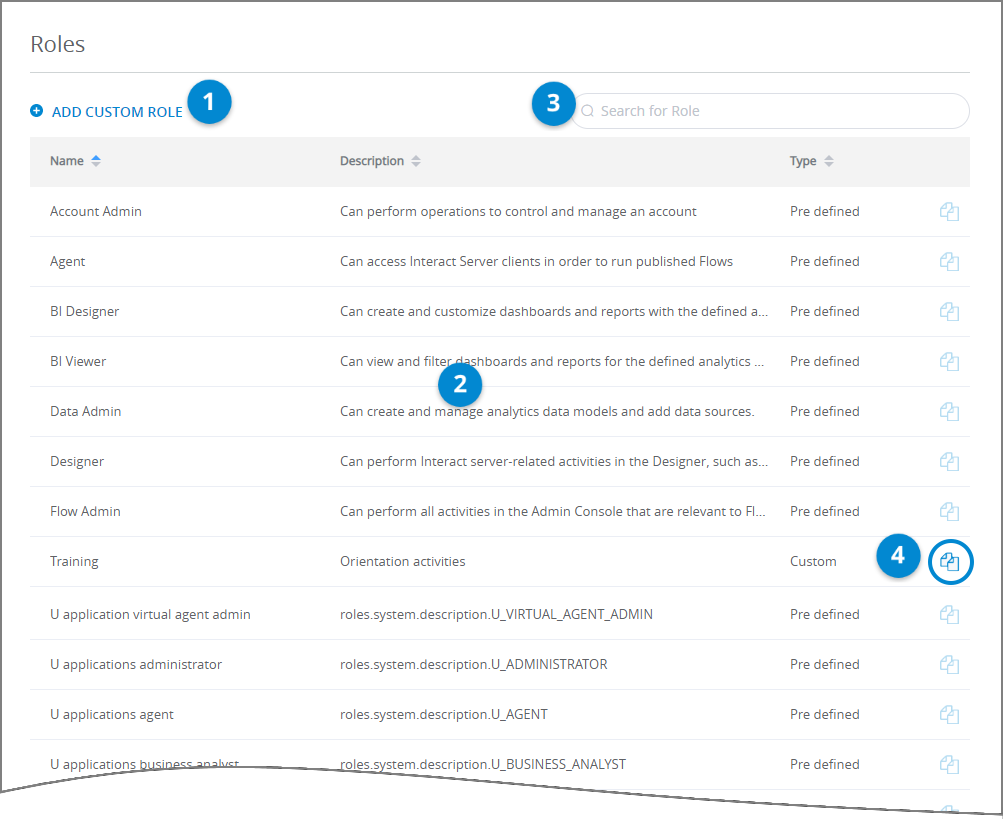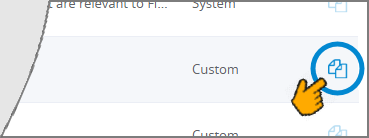User Roles and Permissions
All users need to be assigned a Role when they are added to an account. The Role defines the permissions that are allotted to each user on X‑Platform and the activities that the user is authorized to perform.
The X‑Platform Server supports:
System Roles that provide the user with specific permissions that enable control and management, as well as access to various components of the system or an account. As detailed below, System Roles are predefined and hierarchical, so that a higher-level Role includes all of the permissions that are available to the Role(s) below it.
Custom Roles that provide the user with runtime access to specific Applications and Flows associated with the account. Custom Roles are primarily used to limit access by Agents to specific functionality only. They are not dependent on any System Roles. You can assign multiple Custom Roles to a user. For more details, click here.
Note
Custom Role access restrictions are only effective when working with secured Applications and Flows.
About the Roles Page
To access the Roles page, click Roles from the Account menu of the X-Console.
The Roles page displays the System and Custom Roles currently associated with the account and enables you to add new Roles or edit the details of existing Roles:
 |
Item | Feature | Description | |
|---|---|---|---|
1 | Add Role | Enables creation of new Custom Roles for the current account. Only users with Account Admin Role can create a new Role. For more details, click here. | |
2 | Role List | Displays Roles for the current account.
The list is displayed with Roles sorted by Name in ascending order by default. You can also sort the list by the other columns by clicking on the relevant column heading, in ascending or descending order. | |
3 | Search Box | Enables searching the list for any Roles that match letter in their name. | |
4 | Clone Role | Enables you to duplicate a selected Custom Role, including all of its defined permissions, with a different name.
|
Predefined System Roles
The following Roles are available 'out-of-the-box' for assignment to a new Uniphore tenant. For more details about a specific Role, see its related Uniphore Product Guide.
Role | Permissions |
|---|---|
System Admin | Users with this Role are permitted to perform all operations in any account in the system, as well as X‑Platform Server-related activities. This is the highest-level Role, encompassing permissions of all other X‑Platform Roles. |
Account Admin | Users with this Role are permitted to perform all operations related to control and management of the account, including:
This Role encompasses permissions of Flow Admin and subordinate Roles. |
Flow Admin | Users with this Role are permitted to perform all activities in the X-Console that are relevant to Flow management. Permitted activities involve not only managing the Flows themselves (e.g., changing status and organizing folders), but also working with X‑Platform Server resources that can be used in Flows (e.g., Session Variables, Integration Points, images and themes) and performing deployments of resources and complete environments. This Role encompasses permissions of Designer and subordinate Roles. |
BI Designer | Users with this Role can perform the following Business Intelligence (BI) related activities: creation and customization of Dashboards and Reports using the analytics data available to the Account. |
BI Viewer | Users with this Role can perform the following limited Business Intelligence (BI) related activities: viewing and filtering of Dashboards and Reports using the analytics data available to the Account, exporting Dashboards. |
Data Admin | Users with this Role can perform the following Business Intelligence (BI) related activities: creation and management of analytics data models and addition of BI data sources. |
Designer | Designers are permitted to perform all X‑Platform Server-related activities in the Designer, such as creating, publishing and running Flows, viewing related X‑Platform Server resources (e.g., Session Variables, Integration Points and RPA services). While Designers can access the X-Console, they are restricted to read-only privileges. This Role encompasses permissions of Agent and subordinate Roles. |
Agent | Agents are permitted access to the X‑Platform Server clients (e.g., Mobile, Web and Agent) and to run published Flows. Agents are not authorized to access the X-Console. |
U Applications Administrator | Users with this Role are permitted to define the U-Assist Organization and Business Process setup and perform initial setup activities, e.g., App Profile Settings, Ghost Call Configuration, ASR Engine Setup, CTI Language Mapping, Entity Catalog Setup and Redaction Configuration. |
U Applications Supervisor | Users with this Role are permitted to monitor the U-Assist critical alerts which are sent to the ACW Agents, view Transcriptions and provide live feedback to ACW Agents. |
U Applications Agent | Users with this Role are permitted to receive real-time U-Assist alerts, ACW summaries and ACW dispositions. They can also review and make necessary edits to ACW summaries and ACW dispositions and then submit to the Uniphore platform for Business Analysts to view. |
U Applications Business Analyst | Users with this Role are permitted to set up and manage the U-Assist application configuration including entities, alerts, ACW summaries and ACW dispositions. |
U Applications Quality Analyst | Users with this Role are permitted to set up and manage U-Analyze application configuration settings required for Quality activities. |
U Applications Reporting Analyst | Users with this Role are permitted to set up and manage U-Analyze application configuration settings required for Reporting activities. |
U Applications Super User | Users with this Role are permitted to set up and manage U-Analyze application configuration settings required for Development and QA activities. |
U Applications Virtual Agent Admin | Users with this Role are permitted to set up and manage U-Self Serve application configuration settings required for Virtual Agent administration activities. |
